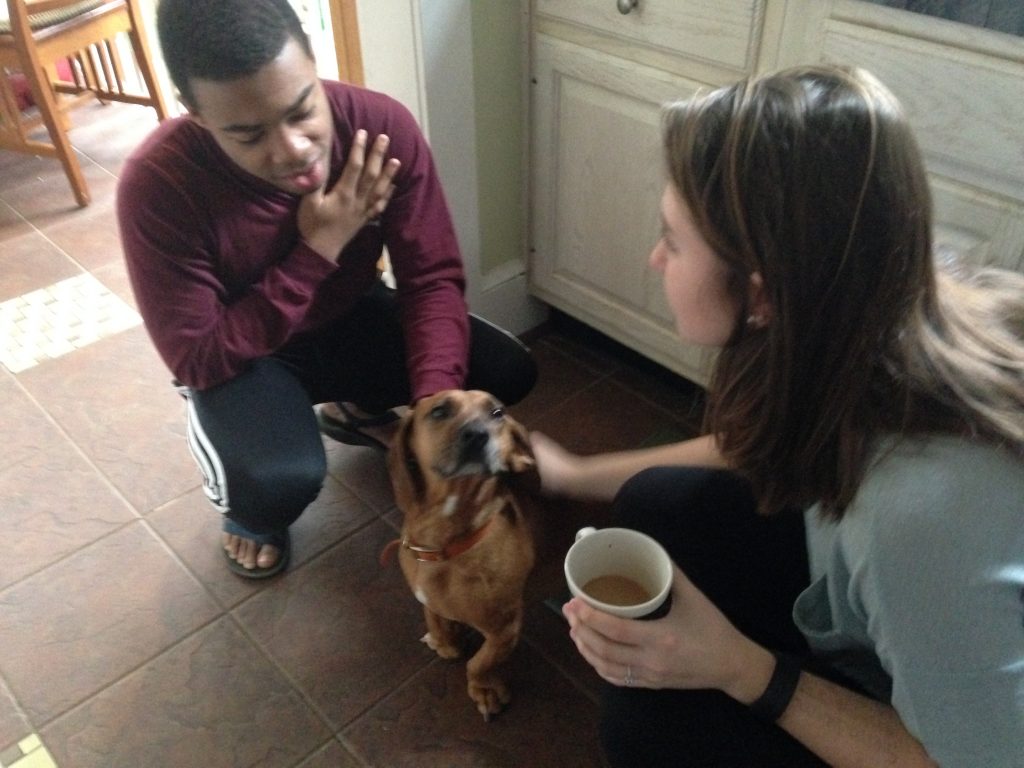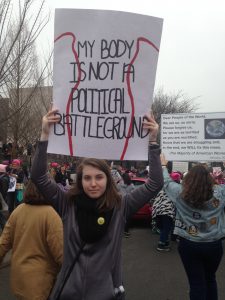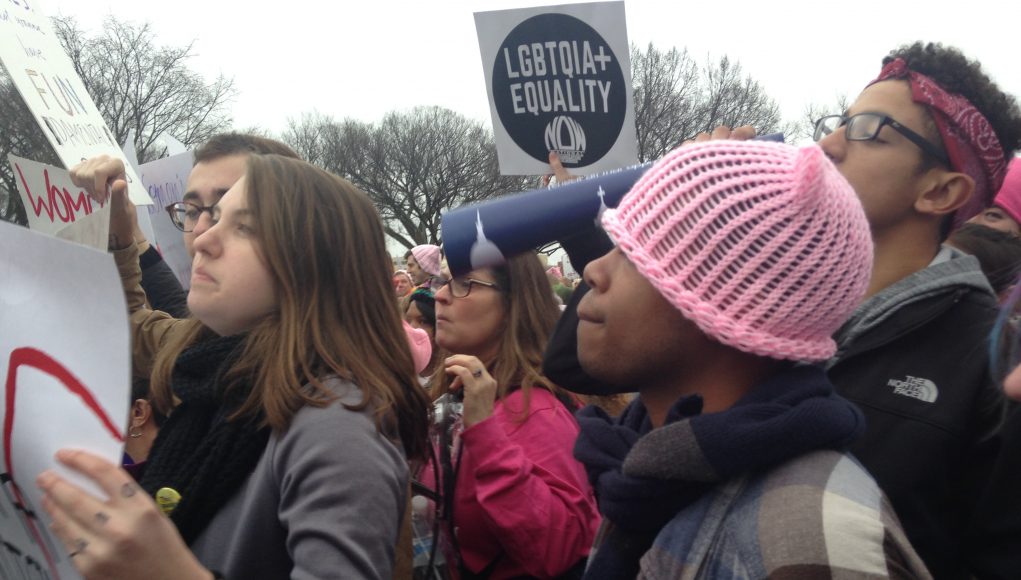Thirteen Centenary College students, two Centenary staff members and I drove to Washington, DC to participate in the Women’s March on Washington on January 21st, 2017, the day after Donald J. Trump was inaugurated as the 45th U.S. president. We took three cars, drove two days to DC, stayed in three different places in Maryland suburbs, rallied and marched all day January 21st, and then drove two days back, arriving the evening of Monday, January 23rd. We spent the night in Nashville at one of the student’s relatives’ house on the way there and on the way back. While everyone on the trip but me attends or works at Centenary, the college did not sponsor the trip.
I interviewed five of the students – Sierra, Samantha, Will, Anastasia and Trey — pre-march to learn why they wanted to go to the Women’s March on Washington and what they expected to get out of it. Why would they spend two days driving up, two days driving back and crashing in strangers’ homes for four nights, all so they could march for one day? There were iterations of the Women’s March occurring in much closer places – Baton Rouge, Austin and, as it turned out, Shreveport (which had about 1500 marchers.) Even when it was not clear the DC March would be organized in time – the idea of it had started spontaneously, just days after Trump won the election – and even when we ran into some logistical issues early on, the thirteen students were determined to go to the one in DC.
A few days after we returned, Dr. Chris Ciocchetti, Associate Professor of Philosophy at Centenary, held a post-March discussion. I recorded what the same five students shared in the discussion.

Pre-March Interviews
Jennifer Hill: Could you please give me a brief description of your backgrounds, where you come from?
Sierra: I grew up outside of Dallas in a home headed by a single mother, with two younger sisters. My mom had to be both the mother and the father. I grew up very independent and always wanted to do everything on my own. The sexist issues and stereotypes of women brought up in the presidential election did not ring true to me. I’ve seen women raise entire families on their own and who have gone through horrific things and have come out on the other side of them. It was shocking to me that this election was bringing back the belief that women are such fragile little things and that it promoted rape culture. I know people have been through stuff like that. It was mind-boggling that high-up political figures were encouraging it.
Anastasia: I am also from the Dallas area. Prior to college I was interested but not involved in politics because I did not know how to become involved. At seventeen, I’m not old enough to vote and I did not know how to effectively use my voice to communicate my thoughts and beliefs.
William: I am from a small, very conservative town in southern Louisiana. I identify as transgender and non-binary.
Samantha: I’m from Shreveport, Louisiana and I became politically aware my junior year of high school, so I was already politically informed when I came to Centenary.

Jennifer Hill: Why did you want to go to the Women’s March and specifically to the one in Washington, DC?
Sierra: I wanted to go because of the sexist treatment and depiction of women in Trump’s campaign and because the majority of my circles are minorities – LGBT, people of color, etc. I felt almost a sense of duty and obligation to the people I love to stand up for how they should be treated, how they deserve to be treated. In terms of going specifically to DC for the March, I constantly had my eye on DC because that’s where it’s all happening. That’s where everything is going to occur in the next four years. I wanted to be part of something so huge and monumental. It was impossible to miss.
Anastasia: I chose to go to the DC March because I believed it had the most chance of being effective and because I wanted the connection of going to our capitol and participating in a protest. There is so much history in DC and the symbolism is incredibly powerful. I wanted a chance to see it first-hand and be a part of such a huge, impactful moment in history.
William: I’m going to the march to support women and their rights, directly in response to Trump’s election. I want to go to DC because there is a sort of grander feeling because it was the original march city. The diversity there is going to be bigger.
Samantha: Particularly as a Hispanic minority woman, I’m going in response to remarks Trump made and policies they want to pass in Congress that are not necessarily in support of my views or in support of LGBTQ community. The issues I’m mainly concerned with involve humanity. Some would be LGBTQ rights, women’s rights, climate change, an unjust justice system, war on drugs, the Dakota Access Pipeline, and foreign relations. I try to stay informed on many different things but these are just a few that the current administration has targeted already.
Trey: I’m going in response to Trump’s election but also in support of women’s reproductive rights. As a male, I think it’s important that men also are a part of this movement because if half of us are held back, we can’t go anywhere, we can’t do anything.

Post-March Discussion, moderated by Dr. Ciocchetti
Dr. Ciocchetti: What did you experience at the march?
Sierra: I got a sense of self-awareness almost. You stand for these causes and you have a few people who are in your immediate circle, but going to an event like that you get to see just how big it is, how much bigger it is than you think. That was a big shock for me. I didn’t know how many people would be there, how big it would be and every time we turned around, the crowd and grown by thousands and thousands of people. You could not move. It really was a testament to how important it was to people and how people are standing for the same things you are.
Trey: In DC, I felt the most American. We talk so much about what it is to be American and what it feels like, and I think the essence of it is finding your relationship to the First Amendment. We are practicing our right to petition, we are practicing our right to assemble, we are practicing our right to free speech all in one instance. And then we think about the fact that America was started on that belief, that our voices need to be heard, that we need to assemble in order to create change. We were effectively making change on Saturday, and so that was the essence of being American. We are standing up for other people’s freedoms and our own freedoms. That came to a head on Saturday.
Samantha: The attitude of the people around me was, “OK, we get it.” America doesn’t get it! It was odd to me because I thought I’d be more politically aligned with everyone I was standing with, but it felt like they weren’t there to listen to people; they were just there for the march and that was it. And they were complaining about how long it was taking. I really resonated with Trey feeling American because as a Hispanic, that is something that is attacked a lot, so I don’t always necessarily feel very American. But in that moment, when there were all these people, I felt very American.
Sierra: One thing I had to recognize was people were there for certain reasons. Some were there for LGBT rights; others were for women’s rights. I was there for all of it. I’d like to think we were pretty united in the things we stood for.
Anastasia: It was interesting to me to see so many [different viewpoints] being represented. However, what I hear back home did not reflect that. They didn’t catch or hold on to the fact that it was more than just abortion being discussed. That was not the whole point of the march, but that was the only thing people who had issues [with the march] were commenting on why I was there — that it was only about women’s reproductive rights. There were so many different things that shoved under [one] banner. [Abortion] is a very hot topic for a lot of people. News articles tended to focus on that aspect of the march, which kind of made sense since it was called “Women’s March on Washington.” A lot of speakers [at the march] touched on that, but again it wasn’t the only thing.
Samantha: I think abortion is also something someone can easily be against, so to label everything under that, someone can say, “I’m not for that. I’m not for this march. Why are you marching?”
Anastasia: Yes, it’s a lot harder to say you’re not for racial equality.
Trey: I liked two things, but the Women’s March on Washington was a moniker for everything else that we were personally feeling. I know a lot of people weren’t there for women’s rights or reproductive rights. I know people were there for Black Lives Matter because a lot of black people really feel that black lives matter. The only avenue they felt they could actively have their voices heard was if they were going to be a part of this larger platform.
Anastasia: It’s interesting that people pointed out that if people had gotten together under the banner Black Lives Matter, it wouldn’t have gone the same way. It wouldn’t have the same reception, in terms of the police.
Sierra: Security-wise, they weren’t ready for the size of the crowd. What I felt interesting about it being titled, “The Women’s March,” was, women are not the first group of people under attack. I was talking to someone who said, “I am not the first minority that will be shot at, but you can bet I’ll be on the front lines protecting those who are.”
Dr. Ciocchetti: Here’s my hesitation. When you say women’s march, what’s leaping to my mind is white women, not Muslim women. [Muslim women] will be on the front lines because they’re easily marked. One of the things that happened was, a women’s march turned out not to be centrally about white women.
Sierra: That’s what I really appreciated about it. It wasn’t about white women. I believe of the speakers, there was only one white man, Michael Moore. We’re not the first group under attack by any means.
Dr. Ciocchetti: But Muslim women are under attack for being women and for being Muslim. Stereotypically, it’s counter to femininity [for women] to speak up for themselves. African Americans have much more of a sense of themselves as a group together than women have had of themselves as a group.
Sierra: The generation of women before us had to fight so much harder, but we aren’t facing those issues on such a big scale. And the women who are [opposing] the march, who say oh, you don’t need to do this – they would not be in the position they’re in without the generations of women before them. In my perspective, they seem to have such a complete disregard for the struggles that have gone on for so long or appreciation for the positions they do hold in society, the jobs that they hold.
Another student on the trip said, “As a female to male transperson, it didn’t make me uncomfortable, but I can imagine a trans woman in the crowd constantly seeing the equation of femininity to vaginas might feel uncomfortable.
William: We do live in such cis-sexist society. The automatic response was, women are under attack, which means vaginas are too. They are, but so are trans women, and I think it would have been very uncomfortable for assigned-male at birth people [to see that at the march.]
Samantha: I’m also a Native American and there were pipeline protesters. There was a Native American woman singing a traditional song.
Trey: There was a woman at the march with her son and his girlfriend and she had cancer. It was super cold that morning and at some point she had to be wrapped in a foil blanket. I got the chance to help wrap her in it. Her son said, “She didn’t have to be here, but this was important for her.” And meanwhile we’re complaining about our legs and back being tired, but here’s a woman who shouldn’t be there. For someone who was basically dying to be there sent the most powerful message to me: that if you’re able-bodied, you should be physically there and let your voice be heard. There was no reason to not be there.

